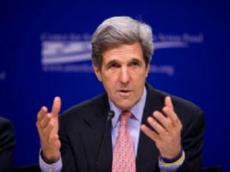|
|
TODAY.AZ / World news
U.S. says nuclear weapon impossible for Iran under nuclear deal
12 August 2015 [14:38] - TODAY.AZ

By Sara Rajabova
The Obama administration is pushing all efforts for Congress to seal the Iran nuclear deal, which was clinched between the Islamic Republic and P5+1 states in Vienna, Austria on July 14 after long-standing negotiations.
The Obama administration is attempting to convince lawmakers that under the deal, Iran’s nuclear energy program would be under international supervision and that the agreement would prevent the Islamic Republic from acquiring nuclear weapon.
In his recent remarks, U.S. Secretary of State John Kerry warned that if the United States doesn’t go through with the deal and demands that its allies comply with U.S. sanctions, the dollar may soon cease to be the world's reserve currency.
Kerry said at a Reuters Newsmaker event on August 11 that by walking away from nuclear deal “as Congress wants to do, will have a profound negative impact on people's sense of American leadership and reliability.”
The top U.S. diplomats’ argument is considered a new method in convincing the Capitol Hill to accept the long-awaited deal.
The Republican controlled Congress has until September 17 to reject the deal, while Obama has threatened to veto any resolution of disapproval from Congress. In order to block a presidential veto, both the House and Senate would have to secure a two-thirds majority vote.
In a speech at a Washington DC university in early August, Obama described a forthcoming congressional vote on lifting sanctions as either a vote for war or for peace. He said the deal is the "strongest non-proliferation agreement ever negotiated".
Kerry went on to say that it would be impossible for Iran, under the nuclear agreement between Iran and major powers, to create a secret program for developing atomic fuel without the United States being able to detect it.
The U.S. administration also believes that Iran in the past few years was not engaged in nuclear development with possible military dimensions.
While noting that the U.S. government has "no doubt" that Tehran has in the recent past, "pursued the developing of nuclear weapons," Kerry however added that according to U.S. intelligence, the Iranians stopped such activities approximately in 2005.
URL: http://www.today.az/news/regions/142854.html
 Print version
Print version
Connect with us. Get latest news and updates.
See Also
- 23 January 2026 [14:47]
Russian envoy in Germany expelled over spying allegations - 23 January 2026 [14:24]
India rushes to contain deadly virus outbreak - 23 January 2026 [13:17]
Iran fires back at Zelensky after Davos remarks, calling him 'clown' - 23 January 2026 [12:18]
Musk predicts AI will outgrow humanity’s intelligence and abundance is closer than we think - 23 January 2026 [11:21]
“We’re watching Iran”: Trump orders US naval armada toward Gulf - 23 January 2026 [11:01]
Trump suggests using NATO provisions to curb illegal migration at US southern border - 23 January 2026 [10:53]
Three-way talks return as Russia, Ukraine and US to meet in UAE with land and security on line - 23 January 2026 [09:00]
Trump: Big retaliation if Europe sells US assets - 23 January 2026 [08:00]
Blue Origin launches Starlink rival project - 22 January 2026 [14:26]
Donald Trump names potential heirs to his political legacy ahead of 2028
Most Popular
 A correspondence that says more than it seems
A correspondence that says more than it seems
 Strategic dialogue between Baku and Washington - how it goes in economy
Strategic dialogue between Baku and Washington - how it goes in economy
 Rutte: Ukraine is NATO's main issue, not Greenland
Rutte: Ukraine is NATO's main issue, not Greenland
 Azerbaijan and BlackRock: Baku has chosen right partners
Azerbaijan and BlackRock: Baku has chosen right partners
 Nizami Cinema Center premieres historical-documentary animation
Nizami Cinema Center premieres historical-documentary animation
 Emin Afandiyev's film awarded at Dhaka Int'l Film Festival
Emin Afandiyev's film awarded at Dhaka Int'l Film Festival
 President Ilham Aliyev meets with CEO of Vitol in Davos
President Ilham Aliyev meets with CEO of Vitol in Davos
